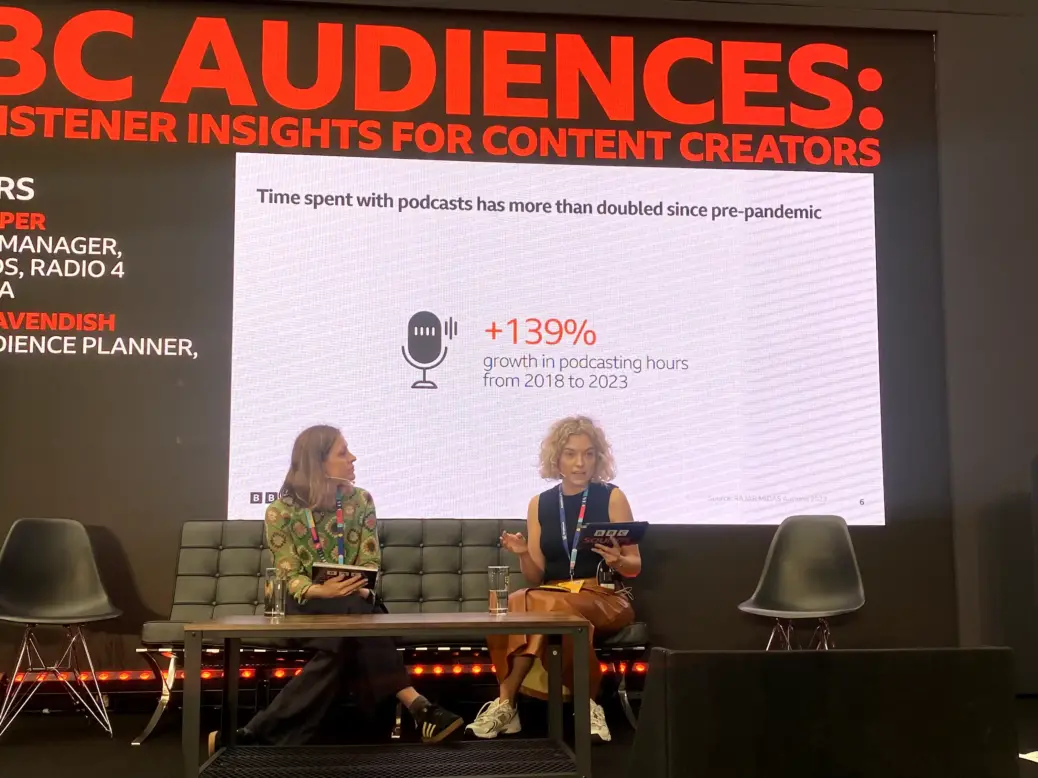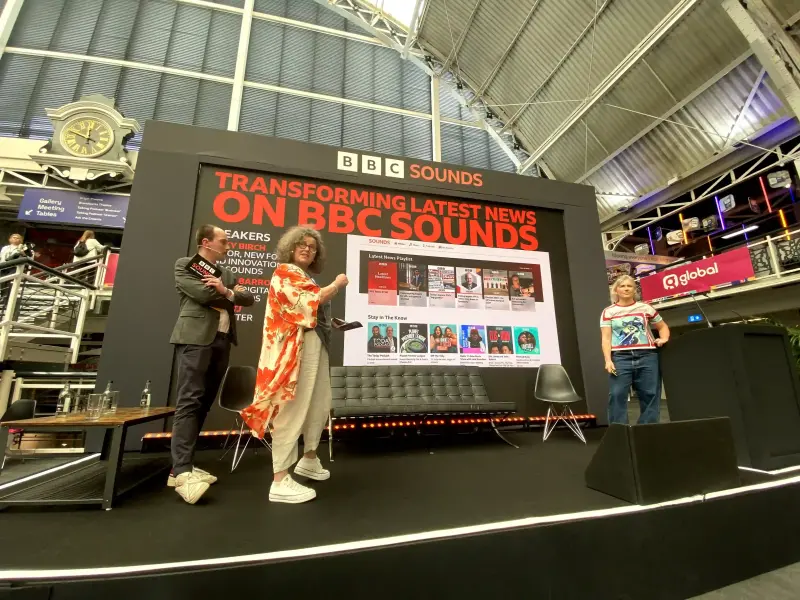
The BBC has publicly shared some of its wealth of UK podcast data, revealing an unexpected dip in youth podcast consumption since the pandemic but continued overall growth in audience for the medium.
Drawing on both original BBC research and the work of third parties Ofcom and RAJAR, staff at the corporation told an audience at The Podcast Show that there was growth of 139% in the number of hours Britons spent listening to podcasts between 2018 and 2023.
UK podcast audiences continue to grow but reach among youngest adults stalls post-lockdowns
Grace Jasper, a research manager for BBC Sounds, Radio 4 and 4Extra, said RAJAR had found that two-fifths of people in the UK aged over 15 now say they have listened to a podcast.
Among that group of 22.4 million people the proportion who say they listen to a podcast at least once a month has grown 16% in the past five years to 68%, Jasper said, while the group that listens weekly is up nearly a quarter to 52%. The group listening several times a week is up by almost a third to 29%.
Jasper said UK podcast audiences skew somewhat male, with women making up 44% of listeners. Despite podcasts’ reputation as a youth medium, she said the mean age of a podcast listener is 44. (The mean age of the UK as a whole is closer to 41, according to Globaldata.)
The most recent figures show podcasts now have their biggest reach among people aged 25 to 34 (with 27% listening weekly) followed by those aged between 35 and 44 (26%).
Among 15 to 24 year-olds the weekly reach of podcasts drops to 24%, making it the only demographic to have lower weekly podcast consumption now than before the pandemic.
Among podcast consumers, the hosts said, 31% prefer to watch a podcast than listen to it. They said there is “a particularly strong appetite for this amongst younger audiences, for example when they’re eating dinner”.
Georgie Cavendish, senior audience planner for BBC Audio, said approximately three in four podcast listeners do so while doing something else, which she said made it important for producers to add multiple entry points into an episode.
She said: “A bit of a litmus test we sometimes joke about is: if someone pops the blender on for a second, would it matter? Would people, fundamentally, be able to find their way back to what you’re saying?”
Original data from the BBC Podcast Tracker found that word of mouth is the most common way people find their podcasts. Recommendations from friends and family was the top discovery route, they said, followed by mentions on social media.
The next most common ways people found a podcast, in decreasing order, were:
- the podcast was associated with a host or celebrity the listener knows
- it was on the homepage of a podcast platform
- they had encountered an advert for the podcast.
Hosts were particularly important for interesting younger listeners, however: Jasper and Cavendish showed one statistic indicating 50% of 18 to 24 year-olds say “they only listen to podcasts from people they’ve heard of”, for example celebrities or influencers, versus 33% for all adults.
BBC Sounds introduces dedicated news section at Ofcom’s prompting

Later on Thursday morning three of Cavendish and Jasper’s BBC News colleagues spoke about how the broadcaster’s audio app, BBC Sounds, has been integrating news into its offering since debuting a dedicated news “rail” in the app in February.
The rail — a horizontally-scrolling section of the app — contains a continually-updated list of news programmes and items, bringing together for example the latest episode of the Today programme’s podcast with reporter-read news stories.
Nicky Birch, BBC Sounds’ editor for new formats and innovation, said the feature had been introduced after broadcast regulator Ofcom instructed the BBC to add more news and current affairs content to Sounds, which the corporation regards primarily as an entertainment product.
The news rail is ordered beginning with a news bulletin before automatically moving through to other, often standalone top stories and news podcasts, but it also allows listeners to skip ahead to other stories or segments. (The New York Times’ NYT Audio app has a similar feature, bringing listeners from flagship podcast The Daily through to the more broadly-focused The Headlines and then some “reporter reads” which see journalists read their stories aloud.)
Standalone stories in the BBC Sounds app may be as little as a minute long and are presented in a manner visually similar to articles on the BBC News app, pairing an illustrating image with a headline. BBC News journalist Owen TJ said the Sounds audience responded differently to the News audience, however, and audio stories generally received greater attention from listeners when they were framed as personal stories or questions rather than straight news stories.
Speaking at the end of the session BBC Sounds controller Jonathan Wall said BBC Sounds currently has five million users a week and nine million a month, with “on-demand speech” the most popular type of content, followed by podcasts and on-demand music.
Email pged@pressgazette.co.uk to point out mistakes, provide story tips or send in a letter for publication on our "Letters Page" blog
